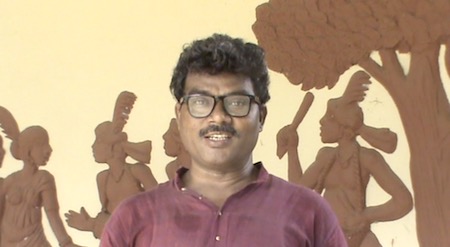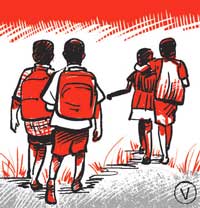Though India is hit hard by the Covid-19 pandemic, our small cluster of two Adivasi villages in West Bengal has not suffered infections yet. We do feel the economic impacts of course. […] Farm work has continued quietly. To many Santals, one lesson of the pandemic has been that agriculture provides the safest livelihoods. It goes on even when other sectors close down. | Read more >>

Regions noted for their wealth of tribal heritage: culture & ecology
Nilgiri Biosphere | Bake Restudy Project (UCLA Digital Library)
Regional Zonal Cultural Centres
Eastern Zonal Cultural Centre, Kolkata
Eastern region – Eastern Zonal Council
North Central Zone Cultural Centre, Prayagraj
Uttar Pradesh
North East Zone Cultural Centre, Dimapur
Seven Sister States & Sikkim – North Eastern Council
North Zone Cultural Centre, Patiala
Northern region – Northern Zonal Council
South Central Zone Cultural Centre, Nagpur
Central region – Central Zonal Council
South Zone Cultural Centre, Thanjavur
Southern region – Southern Zonal Council
West Zone Cultural Centre, Udaipur
Western region – Western Zonal Council
——————-
Up-to-date information: Zonal Cultural Centres >>
Learn more
Adivasi Academy & Museum of Adivasi Voice at Tejgadh | Lecture “A View of Higher Education in India”
Appropriate education for Adivasi children – the Vidyodaya School model at Gudalur
eBook | Background guide for education
Santali education | Teaching Santal children by Boro Baski
Unesco | Unicef | Unicef India | United Nations
United Nations International Days and Weeks
We cannot let our culture and society stop (interview)
Residential, Ashram and Factory schools
- Ekalavya* Residential School Scheme (EMR): a network of boarding schools where tribal children are to be educated in accordance with rules and syllabi provided by the government; such schools are being designated as “Eklavya Model Residential School (EMR)” with the objective of empowering students “to be change agent, beginning in their school, in their homes, in their village and finally in a large context.” – Government Guidelines 2010 | Backup >>
- Residential School and Ashram School
In some regions there are similar “Residential Schools” and “Ashram Schools” for tribal children, as in Tripura where they are managed by a society called “Tripura Tribal Welfare Residential Educational Institutions Society (TTWREIS)” – Tribal Welfare Department, Government of Tripura - Factory schools “exist to turn tribal and indigenous children – who have their own language and culture – into compliant workers-of-the-future. The world’s largest Factory School stated that it turns ‘Tax consumers into tax payers, liabilities into assets’.” – survivalinternational.org/factoryschools | Learn more >>
Up-to-date information about these and related issues: Safe custom search engine >>
* Ekalavya (Eklavya, Eklabya): the name of a legendary archer prodigy “who, being a Nishada [Sanskrit Niṣāda, “tribal, hunter, mountaineer, degraded person, outcast”], had to give his thumb as a fee to the brahmin guru thus terminating his skill as an archer.” – Romila Thapar (“The epic of the Bharatas”) | Read the full paper here | Backup download link (pdf) >>
Note: “Forcibly transferring children of the group to another group” amounts to genocide, which the United Nations Office on Genocide Prevention defines as “acts committed with intent to destroy, in whole or in part, a national, ethnical, racial or religious group” (Article II, d & e)
Learn more about Childrens rights: UNICEF India | Ekalavya (Eklavya, Eklabya), EMR & Factory schools | Rights of Indigenous Peoples >>
